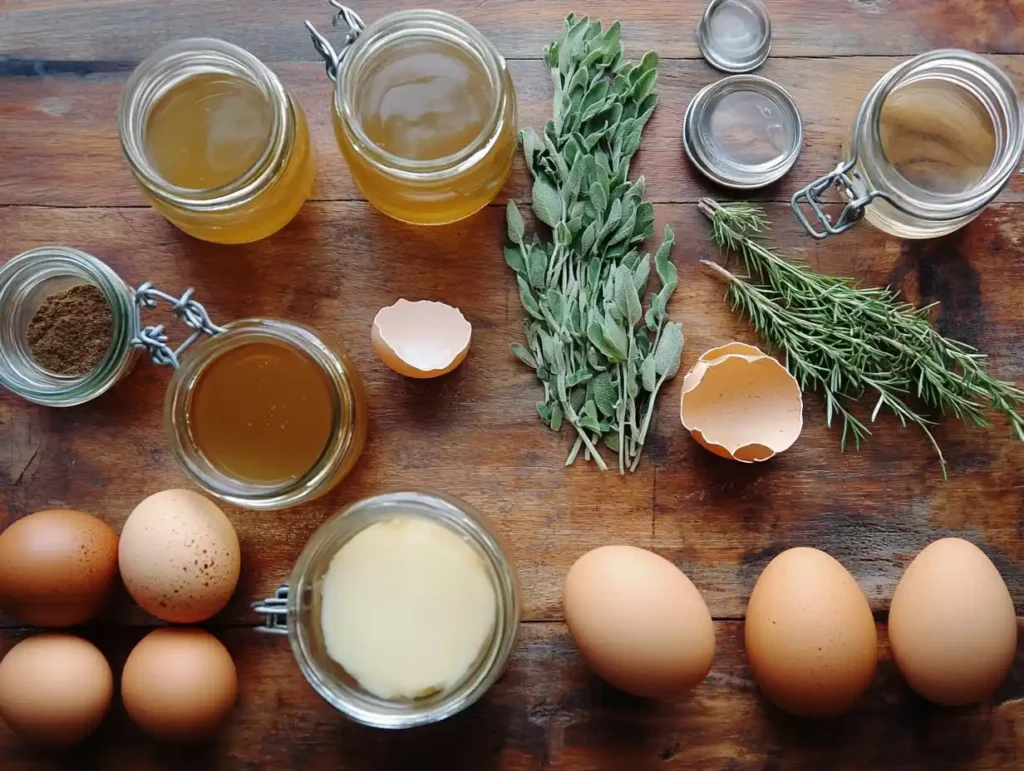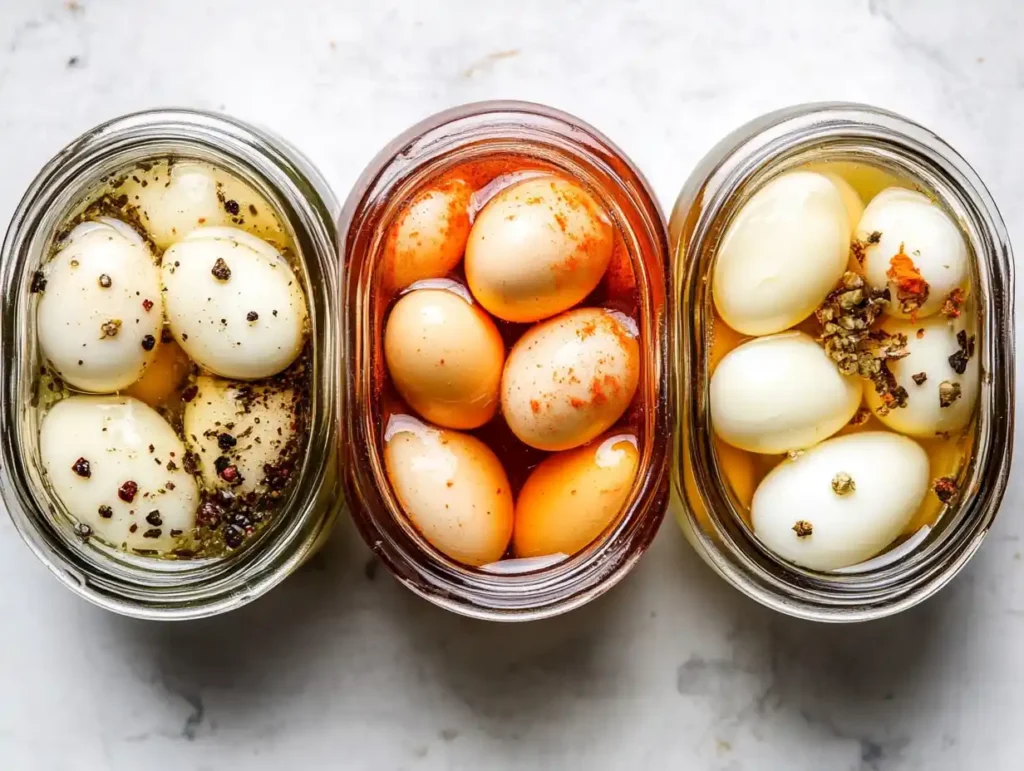Pickled eggs are a popular snack, but choosing the right vinegar can make all the difference. Many wonder—is apple cider vinegar better than white vinegar for pickled eggs? In this article, we’ll explore their differences in flavor, preservation, and health benefits to help you make the best choice for your recipe.
Two of the most common choices for pickling eggs are apple cider vinegar and white vinegar. Both have unique characteristics, ranging from taste and acidity to nutritional content and visual appeal.
But which one is better for pickled eggs? In this article, we’ll explore the differences between apple cider vinegar and white vinegar, their pros and cons, and help you decide which is the perfect fit for your pickling recipe.
Table of Contents
What is Pickling and Why Vinegar is Essential?
The Role of Vinegar in Pickling
Pickling is a process that preserves food using acidic solutions like vinegar. The acidity prevents the growth of harmful bacteria, ensuring the food stays safe and flavorful for weeks or even months.
In the case of pickled eggs, vinegar not only acts as a preservative but also enhances the flavor by infusing tanginess into the eggs. It’s the foundation of any good pickling recipe!
Benefits of Pickled Eggs
Pickled eggs aren’t just tasty—they’re also:
- High in Protein: A great snack option for muscle recovery and energy boosts.
- Low in Carbs: Ideal for keto and low-carb diets.
- Long Shelf Life: Properly pickled eggs can last weeks in the fridge without spoiling.
- Versatile Snack: Enjoy them as a side dish, salad topping, or appetizer.
Apple Cider Vinegar vs. White Vinegar – Key Differences
What is Apple Cider Vinegar?
Apple cider vinegar is made from fermented apple juice, giving it a mildly sweet and fruity flavor. It has a golden amber color and often contains a substance called the mother, which is rich in enzymes and beneficial bacteria. Many people prefer it for its health benefits, including potential support for digestion and weight management. In pickling, apple cider vinegar adds a complex flavor profile that complements eggs and pairs well with spices.
What is White Vinegar?
White vinegar, also known as distilled vinegar, is produced from grain alcohol and has a sharp, clean taste. It’s colorless, making it ideal for recipes where clarity is important. Known for its high acidity, white vinegar is often favored for preserving food due to its neutral flavor and ability to maintain the bright color of ingredients. It’s also more affordable and widely available, making it a common choice for pickling.
Flavor Comparison
When it comes to flavor, apple cider vinegar delivers a milder, slightly sweet taste, while white vinegar offers a stronger, more acidic punch. Apple cider vinegar enhances the flavor of the eggs with its fruity undertones, while white vinegar provides a sharper tang, appealing to those who enjoy a more intense bite.
Acidity Levels
Both apple cider vinegar and white vinegar typically contain 5–7% acidity, which is enough to safely pickle eggs. However, white vinegar is often considered more effective for preservation due to its higher perceived acidity and neutral composition. Apple cider vinegar may require additional care to avoid cloudiness in the brine.
Nutritional Value
Apple cider vinegar contains trace amounts of vitamins and minerals from apples, such as potassium and antioxidants. It’s often praised for its health benefits, including improving digestion and promoting weight loss. White vinegar, on the other hand, is calorie-free and lacks nutrients but still provides antimicrobial properties, making it excellent for preservation.
Pros and Cons of Using Apple Cider Vinegar
Advantages
Apple cider vinegar offers several benefits for pickling eggs. Its mild sweetness and fruity undertones add depth to the flavor, making it an excellent choice for those who prefer rich and complex tastes. It’s also widely regarded for its health benefits, including supporting gut health due to the presence of probiotics when unfiltered varieties with the mother are used. Additionally, its natural amber color can give pickled eggs a warm, rustic appearance, making them visually appealing.
Disadvantages
Despite its advantages, apple cider vinegar isn’t perfect for every pickling situation. Its cloudy appearance, especially if it contains the mother, may affect the clarity of the brine, giving the eggs a less polished look. Its stronger flavor might also overpower the spices used in the recipe, which may not be ideal for those who prefer a cleaner, sharper taste. Additionally, apple cider vinegar is often more expensive than white vinegar, which could be a consideration for larger batches.
Pros and Cons of Using White Vinegar
Advantages
White vinegar is a classic choice for pickling eggs due to its strong acidity and neutral flavor. Its clear and transparent appearance keeps the brine looking clean and professional, which is ideal for presentation. It’s also the most affordable vinegar option, making it perfect for large-scale pickling. White vinegar’s sharp tanginess highlights the spices and seasonings in the brine, making it a great choice for those who enjoy bold flavors.
Disadvantages
On the downside, white vinegar lacks the natural sweetness and nutrients found in apple cider vinegar. Its strong acidity can sometimes taste too harsh, especially for those who prefer milder flavors. Unlike apple cider vinegar, it doesn’t offer any additional health benefits, making it purely functional rather than nutritional.
Best Vinegar for Pickled Eggs – Which One Should You Choose?
Flavor Preference
The choice between apple cider vinegar and white vinegar largely depends on personal taste preferences. If you enjoy a sweeter, more complex flavor, apple cider vinegar is a great option. Its fruity undertones pair well with spices like cinnamon and cloves, giving the eggs a more gourmet feel. On the other hand, if you prefer a sharp, tangy taste, white vinegar is ideal. Its clean acidity enhances the natural flavor of the eggs and allows other spices to shine without overpowering them.
Preservation Strength
Both vinegars have similar acidity levels (5–7%), making them equally effective for preserving pickled eggs. However, white vinegar’s clear appearance and neutral flavor give it an edge when you want to ensure a longer shelf life and a more uniform brine clarity. Apple cider vinegar is still safe for preserving eggs, but its cloudier nature might require additional care to maintain visual appeal over time.
Visual Appeal
If presentation matters, white vinegar is the better choice. Its colorless nature keeps the brine clear, showing off the eggs and spices inside. Apple cider vinegar, while flavorful, gives the brine a yellowish tint, which some may find less appealing. This makes it more suited for rustic or homemade presentations rather than formal displays.
Health Considerations
Apple cider vinegar offers a slight nutritional edge thanks to its enzymes, probiotics, and antioxidants, especially in unfiltered versions with the mother. This makes it a health-conscious choice for those looking to add a boost of digestive benefits. White vinegar, although lacking nutrients, is calorie-free and ideal for those focused on low-calorie diets.
How to Pickle Eggs with Apple Cider Vinegar?

Ingredients and Tools
- 12 hard-boiled eggs, peeled
- 2 cups apple cider vinegar
- 1 cup water
- 1 tablespoon sugar
- 1 teaspoon salt
- 1 teaspoon mustard seeds
- 1/2 teaspoon black peppercorns
- 1 garlic clove, minced
- 1 bay leaf
- A large glass jar with a tight lid
Step-by-Step Recipe
- Boil and Peel Eggs – Boil the eggs for about 10 minutes, cool them in ice water, and peel the shells.
- Prepare the Brine – In a saucepan, combine apple cider vinegar, water, sugar, salt, mustard seeds, and peppercorns. Bring to a gentle simmer and stir until the sugar and salt dissolve.
- Fill the Jar – Place the peeled eggs in the jar, layering them with garlic and the bay leaf.
- Pour the Brine – Carefully pour the hot brine over the eggs, ensuring they’re completely submerged.
- Seal and Store – Close the jar tightly and refrigerate for at least 24–48 hours before serving for the best flavor.
How to Pickle Eggs with White Vinegar?

Ingredients and Tools
- 12 hard-boiled eggs, peeled
- 2 cups white vinegar
- 1 cup water
- 1 tablespoon sugar
- 1 teaspoon salt
- 1 teaspoon dill seeds
- 1/2 teaspoon red pepper flakes
- 1 garlic clove, minced
- A large glass jar with a tight lid
Step-by-Step Recipe
- Boil and Peel Eggs – Boil the eggs for about 10 minutes, cool them, and remove the shells.
- Prepare the Brine – Combine white vinegar, water, sugar, salt, dill seeds, and red pepper flakes in a saucepan. Heat until the mixture starts to simmer, stirring occasionally.
- Fill the Jar – Place the peeled eggs in the jar, adding the garlic for extra flavor.
- Pour the Brine – Pour the hot brine over the eggs, ensuring they’re completely covered.
- Seal and Store – Close the jar and refrigerate for 24–48 hours to allow flavors to develop.
FAQs About Pickled Eggs and Vinegar Choices
1. Does apple cider vinegar make eggs taste sweeter?
Yes, apple cider vinegar has a naturally sweet and fruity flavor due to its base of fermented apple juice. This sweetness subtly enhances the taste of pickled eggs, especially when paired with spices like cinnamon or cloves. If you prefer a milder, tangy sweetness, apple cider vinegar is an excellent choice for pickling.
2. Is white vinegar safer for long-term storage?
Both apple cider vinegar and white vinegar have similar acidity levels (5–7%), which are sufficient for preserving pickled eggs. However, white vinegar’s clear and sterile composition may help maintain the clarity and stability of the brine longer, making it slightly better for long-term storage.
3. Can I mix both vinegars for pickled eggs?
Absolutely! Mixing apple cider vinegar and white vinegar allows you to enjoy the best of both worlds—the sweetness of apple cider vinegar and the sharpness of white vinegar. This combination also helps balance the flavor profile while maintaining a clearer brine compared to using apple cider vinegar alone.
4. Which vinegar prevents discoloration better?
White vinegar is the better option if you want to preserve the natural color of the eggs. Its clear and colorless nature ensures that the brine remains bright and transparent, keeping the eggs visually appealing. Apple cider vinegar, on the other hand, may add a slight yellow tint to the brine, which can affect presentation.
5. Does the vinegar type affect the shelf life?
No, the type of vinegar doesn’t significantly affect the shelf life as long as the acidity level is at least 5%. Both apple cider vinegar and white vinegar can preserve pickled eggs safely for up to 3–4 months in the refrigerator when stored properly in a sealed jar.
6. Are pickled eggs with apple cider vinegar healthier?
Pickled eggs made with apple cider vinegar may offer additional health benefits due to the presence of antioxidants, probiotics, and enzymes, especially in unfiltered versions with the mother. These properties can aid digestion and promote gut health, making them a slightly healthier option compared to those made with white vinegar.
Conclusion
Choosing the best vinegar for pickled eggs depends on your taste preferences, presentation goals, and health priorities. Apple cider vinegar brings a fruity sweetness and added nutritional benefits, perfect for those looking for a healthier twist. Meanwhile, white vinegar delivers a sharp, clean flavor and ensures a clear brine, ideal for a classic pickled egg look.
Whether you’re experimenting with flavors or sticking to a traditional recipe, both types of vinegar provide excellent results. For variety, you might even consider mixing the two to create a balanced flavor profile. Ultimately, the choice comes down to your personal preference and the experience you want to create with your pickled eggs.
To further enhance your pickling skills, explore our Spicy Pickled Eggs Recipe for a zesty twist. Additionally, learn how to prevent rubbery textures with our guide on Making Pickled Eggs Not Rubbery. For insights into storage, read How Long Do Pickled Eggs Last in Vinegar?.

